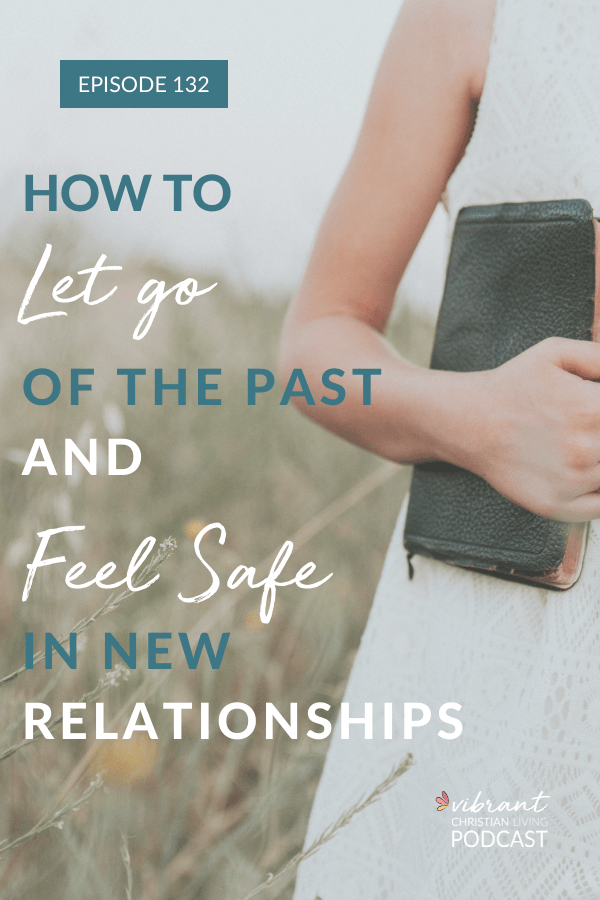Have you ever felt held back being who you want to be in a relationship? Maybe you’ve had past hurts and those keep you from new relationships. You might want to meet new people and develop deeper relationships, but then you self-sabotage the relationship and cut off the relationship before things get started.
What deeper mindsets are at play here? How might our identity in God (and our relationship with God) play a role in feeling safe in relationships?
IN TODAY’S PODCAST EPISODE:
- [1:24] Struggling with past hurts in relationships
- [4:09] Recognizing and coping with our soundtracks from the past
- [8:43] Wanting to be heard by others
- [12:18] Fear of rejection in relationships
- [16:34] Gaining confidence and clarity through behavior reinforcement
- [18:43] The underlying story about security and feeling safe with God
- [26:26] Understanding God’s love
- [28:08] Working through our issues with God to heal past hurts
- [29:30] Key takeaways from this coaching session
- [31:50] LISTENER QUESTION: How can I handle certain situations or people that trigger me?
[1:24] Struggling with past hurts in relationships
Susan came into this coaching call having realized that she wanted work through relational issues. She was struggling with her relationship with God, especially when it came to trust. Events from the past seemed to come back around in the present, and it felt like a vicious cycle. She wondered why it didn’t feel like God was helping her to handle these things.
When she would listen to other people’s testimonies, she tended to feel like it did more harm than good. Sometimes it was encouraging, but she also felt as though she went down the wrong paths and got burned again if she listened to what she felt God was telling her.
Susan shares that cultivating safe friendships with women continues to be a struggle. Women can be cruel to one another, and Susan shared that she got involved with the same sort of toxic relationships repeatedly. She wondered, does it ever get to a point where you’re like, okay, I’ve conquered this; I’m good with this and now I can move to the next issue – or is every issue always related to this core soundtrack surrounding relationships? Everything seems to bring her back to the same place.
[4:09] Recognizing and coping with our soundtracks from the past
It is a constant growing process to work through these soundtracks from the past. We all have different areas of weaknesses based on those prior experiences. As we heal, they come up again, and we are getting to a different layer.
I asked Susan to share more about her lack of trust when it comes to her relationships with other women or with God. When Susan reaches out in ministry or tries to enter into a new friendship, she tends to feel like it isn’t working out within a couple of weeks. She feels like her input is being ignored, she is invisible, and she isn’t doing anything valuable. Then she questions whether this was the direction she was supposed to go in, her walls go up, and she is done. In friendships, she often feels like she isn’t getting any positive feedback or acknowledgement. She doesn’t trust herself to accurately hear what she is being led to do.
Based on that information, I inquired about Susan’s past. Were there things that happened that made her feel unseen or unheard?
Susan described the feeling as “invisible”, and noted that she even asks her husband at times whether he notices this pattern playing out. She will give input and suggestions, and it seems like people don’t listen. When someone else says the same thing, however, others think it’s a brilliant idea. Her husband has acknowledged that this does seem to happen, and Susan feels it has been repetitive. In her workplace, she is a director and needs to be heard.
[8:43] Wanting to be heard
It has been a constant struggle for her to feel as though her ideas were heard – she often wants more feedback, and acknowledgement that the message was received.
When that issue comes up, Susan reacts in a similar way as her interpersonal relationships. Her walls come up, and she wants to walk away. It’s more evidence that people don’t listen to her, and she shuts down. I pushed her to think about what was keeping her from going up to someone and engaging in a conversation about her idea in order to gain that feedback and acknowledgement. She told me that she thought it was because she didn’t want to ruin the relationship. When she feels like a relationship has ended, she blames herself and feels like she did something to ruin it. So instead, she says nothing. She tries to deal with it inside herself, instead of bringing in the other person.
Susan recognized that this was not an effective strategy, and she often ended up blaming herself and thinking something was wrong with her. She would go to her husband or her sister and ask what she had done, or what was wrong with her, and they couldn’t provide a satisfactory answer.
[12:18] Fear of rejection
When I asked what was different about her husband and her sister, Susan shared that she felt comfortable with them. She also mentioned that if her sister ever stopped talking to her, she would just make her talk to her. I then pointed out that it seemed like she had a deep connection with those two people, and it was in her mind that those relationships were going to work regardless. They could talk through anything. With other people, Susan had this protective mindset because she feared being rejected and didn’t want to get hurt again.
When Susan would sort of dip her toe into a new relationship, those fears would come up again – the feelings that something is wrong, people aren’t listening, and she’s broken. The safety she feels with her husband and her sister isn’t there. I suggested that she think about the skills she uses in those safe relationships to connect, work through issues, and give herself a voice. She decided that she has to get her mind around the idea that the conversation might not work out the way she would like, but at least she would have said her piece and communicated her perspective to the other person about the breakdown in their relationship.
[16:34] Gaining confidence and clarity through behavior reinforcement
Susan shared that she takes a lot of responsibility on herself for the state of a relationship, especially a new relationship. Her inner voice says, “how could it be them? This happens to you over, and over, and over – it has to be you.” I totally understood why she would feel that way, because every time she puts her walls up and walks away, that behavior is reinforced. She hasn’t tried a different behavior, so her inner voice has no other experiences to draw from.
As we talked about with the inner critic, this voice is there for a reason. This voice is telling you that it doesn’t feel safe to do this. It’s scary to share with others in this way. In order to take a risk like this, your mind wants to know there is security and safety ahead. It can be so hard to accept failure unless you are secure in who you are and in your identity as God’s daughter.
[18:43] The underlying story about security and feeling safe with God
Susan resonated with this suggestion right away. She agreed that if she felt truly secure with her identity in Christ, in her heart, none of this would bother her as much as it does. I suggested that additional security might give Susan the foundation to initiate those tough conversations with other people and to continue to put herself out there.
She also admitted that this was a deeper issue when it happened with other Christians, because she felt as though they were in a better position with the Lord than she was. This feeling only amplified her inner critic telling her that they must be right, and she must be wrong.
There are, of course, several strategies when it comes to responding to other people. But really, the issue here is Susan’s hesitation. That hesitation stems from the lack of confidence in her identity. So I asked Susan what she felt her next step was, or what she felt she had to work through regarding her relationship and trust issues with God.
Susan wasn’t sure, so I prompted her to think about what scared her about trusting God. It became apparent to her that she felt as though she had to take responsibility for everything. She shared that her father passed away when she was four years old, and she had a vivid memory of her uncle pulling her and her sister aside to tell them what had happened. Immediately, Susan felt like she had to take care of things. She had an older sister and a mother, but for whatever reason she felt as though she had to be responsible.
That deeply rooted soundtrack from the past caused Susan to take on tremendous responsibility in all areas of her life. She has to take care of herself, her home, her husband and her pets. She didn’t know where it came from, but she was having difficulty letting go of it and putting her trust in God.
I shared that I understood, saying it’s so hard for those of us who want to take control, organize things, and make things happen. And yet, we serve a God who is a mystery, who is unpredictable, and who does things outside of our understanding. While we’re in the middle of something, we usually don’t understand it until after the fact.
For Susan, she experienced a trauma at a young age and has had this “responsible” mentality for many years. It’s really hard to let go, because her inner voice might say, “If God has it, then why doesn’t He answer it this way?”
Again, Susan really identified with this idea. She has in her mind what she thinks should happen, but if God answers in a different way then she feels like He didn’t answer at all. If things don’t unfold the way she thinks they should, she is done. It becomes about our interpretation of what happens. God may not answer the way we thought He would, but He is still God. He still knows more, and we need to come to a place where we are okay with however He answers us.
[26:26] Understanding God’s love
This is why it is so important to come to an understanding and appreciation of God’s love. If we believe “God truly loves me,” then we can perceive everything He does through that lens of love. If we believe that every decision He makes is out of love, then what do we need to do to accept that this is His loving act? How can we be more willing to let it happen?
God sometimes uses tragedy to grow us and shape us. He allowed Jesus to go into the wilderness to be tempted. We may not understand why something isn’t working out the way it should, but we have to trust that God loves us, and that He is good. There’s all this evidence that we could give for God’s love in the scriptures, but at the end of the day we really just have to believe it in our hearts. We have to relax into that and trust what God is doing. Everything is built on this love, including our own perceptions of ourselves as confident, brave, and courageous people. We have to know, believe, and trust that God has our backs.
[28:08] Working through our issues with God
Susan and I had to think about wrestling through some of this with God. What was making it hard for her to acknowledge God’s love or to trust Him? She agreed that she needed to have those conversations with Him, and I commended her for having the bravery to do that. It’s easier to stay in our safe places and to stay in a world where her only relationships are her husband and her sister. But Susan wants more. She wants more female friendships, and she wants to go deeper with her ministry and her calling in life. God wants to give her those things, but she has to be open to His help.
[29:30] Key takeaways from this coaching session
Susan really wanted to work on acknowledging that just because things don’t go the way she expects that doesn’t mean that God is not good or loving. She decided to focus on God’s love, and on being God’s daughter. Focusing on that security is going to free up her brain for so many other things. When these relationship issues surface again, she can better filter out the thoughts that other people don’t like her or that she can’t trust God to guide her through.
[31:50] LISTENER QUESTION: How can I handle certain situations or people that trigger me?
Here is a question that was sent to us: “How can I handle certain situations or people that trigger me? What can I do to help myself enter those situations more strong and able to handle the triggers?”
So, I’m assuming from this question that this is someone who is expecting there to be a trigger coming – maybe from a certain family member visiting or a certain situation or location that reminds them of something and triggers a thought pattern. It sounds like this person is anticipating something in the future. With that in mind, I would say that triggers are normal. We all have them, and we all have different ones. But we can learn specific coping skills to prepare for them.
I would encourage you to say, okay, I know this is going to happen and I may be triggered. Here are some defense mechanisms that I can have in place. I’ll walk us through some of the questions here, and all of this is covered in more detail in the Christian Mindset Makeover.
First, I would outline specifically, what is the trigger? What causes it? Is it a certain person? Is it a certain location? Is it something that someone says? Is it a tone of voice? Be as specific as you can about it, because this will help you really understand that feeling.
Next, I would determine what specific thing is happening when the trigger enters. I want you to go to that place where your thoughts spiral, just to be able to notice what happens. You don’t have to go super deep with it, but just enough to notice what is happening inside of you. Write it down, acknowledge it, and see it as real and as something that may come up again.
Then, I would ask yourself what makes sense about this trigger. How might this be a response to keeping you safe from past trauma? One thing we know about the brain is that it is always trying to protect us. Its number one function is to keep us alive, and it’s also trying to keep us safe based on what it learned from past trauma. Doing this helps us to acknowledge that these feelings are logical, and that you are under a lot of extra stress. Just acknowledging that these feelings are real and logical goes light years in helping yourself work through these triggers.
After doing that, think about what is true and what is not true about the thoughts that are being triggered.
Finally, in light of all the work I discussed above, think about what you are going to choose to believe. This is the part of the game plan where you can say, I won’t be surprised, angry, or frustrated when this happens. I already know it will happen, and I have ideas for how to respond. It makes sense that I feel this way, and I need to recognize what is true and what is not true. I am also 100% in charge of where I’m going to dwell in light of this situation. This is a great example of what you can learn in the Christian Mindset Makeover, so I encourage you to check it out if you’re interested!
Other Podcast Episodes on Overcoming Past Hurts and Healing Your Relationship with God:
- Ep 91: What Does it Mean to Know God?
- Ep. 93: “How Can I Make Spending Time with God a Priority?”
- Ep: 99: 3 Categories of Spiritual Growth Obstacles: Pt. 3: Relationship Issues with God
- Ep. 109: Cultivating Authentic Friendships with Amanda Anderson
Please Subscribe to the Podcast + Leave a Podcast Review
- First, please subscribe to the Vibrant Christian Living Podcast in your favorite podcast player (subscribe here on Apple Podcasts or follow on Spotify),
- leave a review (5 stars if you loved it) and comment HERE.
FREE WORKSHOP: Learn How to Transform Your Thoughts to Transform Your Life
Do you find it hard to let go of worry? Struggle with feeling you’re never enough?
Or maybe you’re frustrated because you can’t make the changes you want in your life (lose the weight, start new habits or grow in a certain area)?
Both brain science AND scripture show that every action we take starts first with a thought. If we change our thoughts, we can change our results.
That’s why I want to give you the inside scoop on the most effective ways to change our thoughts at this FREE WORKSHOP!
Sign up now at VibrantChristianLiving.com/mind

At this FREE WORKSHOP you’ll learn:
- Why it makes sense you’re stuck in toxic thought patterns
- The truth behind 3 popular myths on how to overcome negative thoughts
- A simple 3-step strategy to manage negative thoughts in-the-moment (this powerful tool alone is worth coming!)
Plus you’ll get an inside look at the Christian Mindset Makeover™–the only course that equips Christian women with powerful brain-science + biblically based tools to break free from negative thoughts—in only 9 weeks!
Go now to VibrantChristianLiving.com/mind right now to sign up for this amazing FREE WORKSHOP to learn how to transform your thoughts to transform your life.


